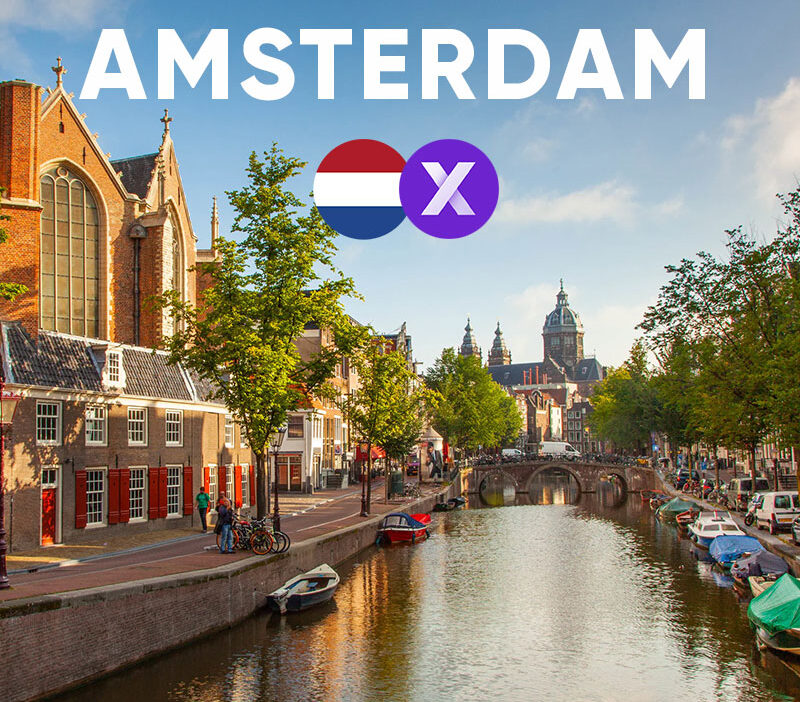Moving to Amsterdam is more than a dream — it’s a smart move in 2025. This guide covers everything from housing to healthcare in the Dutch capital.
Amsterdam is far more than tulips, bikes, and narrow houses. It’s one of Europe’s most livable cities for internationals — organized, creative, safe, and deeply tolerant. Whether you’re a startup founder, freelancer, or simply craving a well-designed life, Amsterdam hits that rare balance of charm and functionality.
Yes, it’s expensive. But it’s also exceptionally rewarding.
Key Facts About Amsterdam (Netherlands)
| Parameter | Value |
|---|---|
| Population | ~900,000 (city), ~2.5 million (metro area) |
| Language | Dutch (official), English widely spoken |
| Currency | Euro (EUR) |
| Average Rent | €1,500–2,500/month (1-bedroom in good area) |
| Average Net Salary | €2,800–4,000/month |
| Digital Nomad Budget | €2,500–5,000/month |
| Health Insurance | Mandatory private (~€100–150/month) |
| Safety Level | High – clean, safe, very bike-friendly |
| Public Transport | Trams, metro, trains, bikes – OV-chipkaart ~€100/month |
| Climate | Maritime – mild winters, cool summers, rainy |
| Residence Permit / Long Stay | Work, study, startup, HSM visa, family reunification |
| Education | International schools, top universities (UvA, VU) |
| Grocery Prices | Moderate – AH, Jumbo, Lidl, local markets |
| Access to Nature | Parks, canals, lakes, North Sea 30 mins away |
| City Atmosphere | Open-minded, progressive, diverse, artistic |
Renting in Amsterdam: Tight Market, High Demand
Finding a place to live in Amsterdam can feel like a full-time job. The rental market is tight, especially in the city center, and competition is high. But with patience (and possibly a Dutch friend), it’s doable.
Average monthly rent in 2025:
- Studio or 1-bedroom in city center (Jordaan, De Pijp): €1,400–1,800
- 2-bedroom in outer neighborhoods (Amsterdam Oost, Nieuw-West): €1,700–2,300
- Utilities: €150–250/month
- Internet: ~€40/month
- Deposit: Usually 2 months’ rent
Looking now? Explore long-term rentals in Amsterdam on XMetr.
Visas and Residency: Structured and Startup-Friendly
The Netherlands has one of the most startup- and expat-friendly immigration systems in Europe. Several visa options make it realistic for long-term relocation:
- Highly Skilled Migrant Visa – for professionals with job offers
- Startup Visa – for founders with innovative ideas and Dutch facilitators
- Orientation Year Visa – for recent graduates from top universities
- Freelancer / Self-employed Visa – harder to get but possible
- EU/EEA citizens – free movement rights
- Partner Visas – available for spouses or cohabitants
Permanent residency is possible after 5 years of legal residence.
Language and Integration
Most Dutch people speak excellent English, and you can live your entire life in Amsterdam without learning Dutch. But if you plan to stay long-term, learning the language makes integration smoother — and it’s often required for residency.
Life in the city feels progressive, safe, and beautifully maintained. There’s a strong cycling culture, efficient public transport, and a mix of international and Dutch communities.
Where to Live in Amsterdam
- Jordaan – charming canals, trendy, expensive
- De Pijp – young, multicultural, food scene
- Amsterdam Oost – quieter, residential, growing in popularity
- Westerpark & Bos en Lommer – green, family-friendly
- Amsterdam Zuid – upscale, international schools
- Noord – across the IJ River, creative, more affordable
Tip: Bike lanes are everywhere, so living 20–30 minutes from the center is completely normal — and often more affordable.
Top 5 Best Neighborhoods in Amsterdam for Long-Term Living
| Neighborhood | Why It’s Great |
|---|---|
| 1. De Pijp | Trendy, young, full of cafés, multicultural life and energy. |
| 2. Jordaan | Quaint, charming, canal-side streets, boutique lifestyle. |
| 3. Amsterdam Oost | Emerging, peaceful, parks and cozy cafés – growing in popularity. |
| 4. Oud-West | Balanced, green, close to Vondelpark and nightlife spots. |
| 5. Amsterdam Zuid | Upscale, quiet, family-friendly, close to business hubs and schools. |
Cost of Living in Amsterdam
Amsterdam isn’t cheap, but the quality of life matches the price. You’ll need a solid income or remote job to live comfortably.
- Rent: €1,500–2,500/month
- Groceries: €300–500/month
- Public transport: €100/month
- Dinner for two: €60–90
- Coffee: €3.50
- Gym: €35–60/month
- Health insurance (mandatory): €120–150/month
Expect €2,500–3,500/month for a solo, middle-class lifestyle.
Work and Income
Amsterdam is a hub for:
- Tech startups and scale-ups
- Creative industries (design, architecture, media)
- Sustainable business and innovation
- Finance and logistics
- Remote workers and freelancers
You’ll find co-working spaces, fast Wi-Fi, English-speaking jobs, and a collaborative business culture. Salaries are competitive but taxed relatively high — offset by public services.
| Profession | Avg. Gross Salary per Month (EUR) |
|---|---|
| Software Developer | €4,800 |
| IT Project Manager | €5,500 |
| UX/UI Designer | €4,200 |
| Architect | €4,000 |
| Mechanical Engineer | €4,300 |
| General Practitioner (Doctor) | €6,800 |
| Nurse | €3,400 |
| High School Teacher | €3,600 |
| Marketing Specialist | €4,200 |
| Accountant | €4,100 |
🚲 Amsterdam offers strong salaries and exceptional quality of life, especially for cyclists and creatives. Rent is high, but public services and work-life balance are among the best in Europe.
Healthcare: High-Quality and Mandatory
The Netherlands has a private insurance system, but it’s heavily regulated and excellent.
- Basic health insurance is mandatory for residents
- Average monthly premium: €120–140
- Doctor visit: Often covered fully
- Dental: Separate insurance or out-of-pocket
- Emergency care: Efficient and modern
You’ll never be surprised by costs — it’s a very transparent system.
Final Thoughts: Is Amsterdam Right for You?
Amsterdam isn’t for everyone — it’s pricey, rainy, and bureaucratic at times. But if you’re drawn to structure, freedom, and culture woven into everyday life, it can feel like a dream.
Come for the canals. Stay for the competence.
Also read our post about Moving to Tokyo
